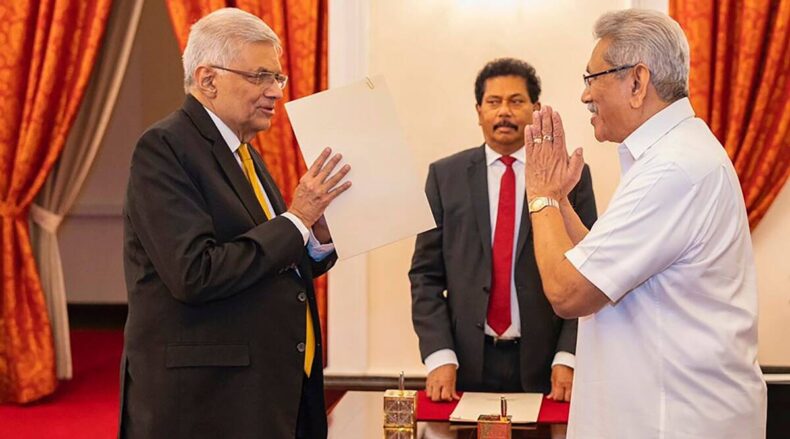SRI LANKA UPDATE: Sri Lanka’s new Prime Minister, Ranil Wickremesinghe, has stated that he is looking forward to better connections with India during his tenure and has hailed India for its economic help as Sri Lanka faces its worst economic crisis since independence.
Thursday, 73-year-old Ranil Wickremesinghe was sworn in as Sri Lanka’s 26th Prime Minister to stabilize the country’s debt-ridden economy and stop the political unrest. Prime Minister Wickremesinghe stated, in reference to India’s economic help to his country, “I desire a deeper connection and I want to thank Prime Minister Modi.”
After taking the pledge, he spoke during a religious service conducted here yesterday night. Since January of this year, India has pledged more than $3 billion to Sri Lanka in the form of loans, credit lines, and credit swaps.
India stated on Thursday that it looks forward to working with the new Sri Lankan administration created via democratic procedures, adding that New Delhi would maintain its commitment to the people of the island nation.
Since Monday, when President Gotabaya Rajapaksa’s brother and Prime Minister Mahinda Rajapaksa resigned following an attack on anti-government protesters by his supporters, the country has been without a government. The leader of the United National Party (UNP), who is 73 years old, assumed the position of prime minister on Tuesday.
The incident sparked widespread violence against Rajapaksa followers, resulting in nine deaths and over two hundred injuries. PM Wickremesinghe stated that he was solely focused on addressing the economic problem. Prime Minister Wickremesinghe stated, “I want to resolve this issue to guarantee the people have access to gasoline, diesel, and power.”
The biggest opposition party Samagi Jana Balawegaya (SJB) and the third-largest party Janatha Vimukthi Peramuna (JVP) set stringent conditions, including the resignation of the President Rajapaksa, to the appointment of Ranil Wickremesinghe as prime minister. Prime Minister Wickremesinghe leads the transitional administration in which all political parties will participate for a limited time before parliamentary elections are held.
According to reports, members of the ruling Sri Lanka Podujana Peramuna (SLPP), a portion of the main opposition SJB, and many smaller parties have voiced support for Ranil Wickremesinghe’s majority in Parliament. However, some forces rejected Ranil Wickremesinghe’s appointment as the new prime minister. According to the JVP and the Tamil National Alliance, his appointment was unlawful.
The seasoned politician is thought to have close ties to the Rajapaksa family. However, he now has little backing from the opposition or the general public. To be determined is if he can demonstrate his majority in the 225-member Parliament. The Communist Party’s Weerasumana Weerasinghe stated, “We will give him room.”
The Sri Lanka Freedom Party, the party of former President Maithripala Sirisena, said that its central committee will convene this morning to make a decision. Ceylon Workers’ Congress, the trade union cum political organisation for the Indian-origin plantation population, stated that they will back Prime Minister Wickremesinghe. Widespread demonstrations demanding political reform and the resignation of President Gotabaya Rajapaksa have been sparked by Sri Lanka’s greatest economic crisis.
President Rajapaksa declared a state of emergency on April 1 and lifted it five days later. The government reinstated a state of emergency on May 6 after police sprayed tear gas and detained protesting students near the parliament, which had been postponed until May 17.
Although the protests have been mainly nonviolent, the police shot and killed a demonstrator on April 19 and deployed teargas and water cannons against protestors on other occasions. The authorities have made several arrests and enforced curfews on multiple occasions.
The political crisis erupted at the end of March when individuals affected by prolonged power outages and shortages of basic necessities demanded the resignation of the administration. In reaction to the call for resignation, President Rajapaksa dismissed his government and chose a younger one. His secretariat has been the subject of a continuous protest for almost a month. On Monday, his brother Mahinda Rajapaksa resigned as prime minister to allow the president to create an interim administration comprised of all major parties.













